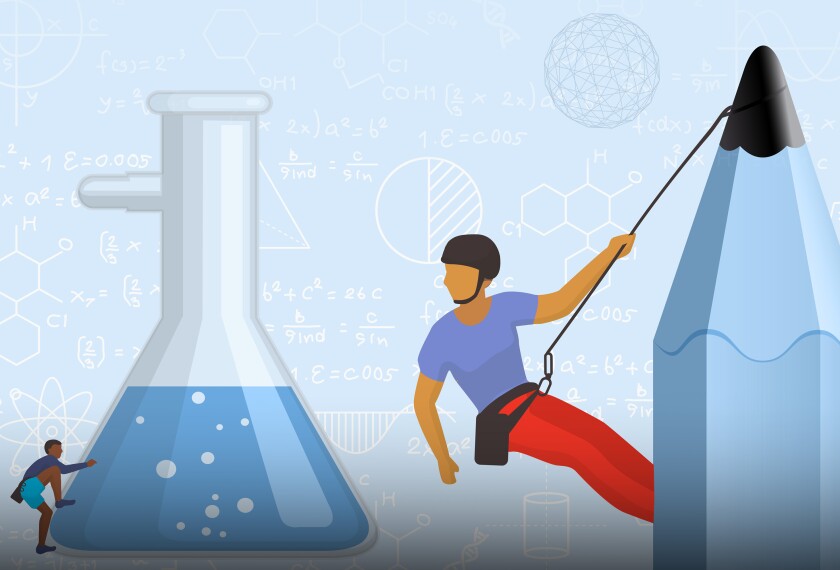The postings on the National Lab Day website are akin to something you might find through an online dating service. Only these aren’t from lonely singles looking for a soul mate. They’re from teachers seeking help with hands-on science projects, whether the expertise of a scientist or engineer or money to help pay for a special activity or lab equipment.
The titles give a flavor of what teachers are after: “Extreme Science Lab Make Over,” from a teacher in Webster, Texas. The “Butterfly Garden,” from Aurora, Ill. “Cells R Us,” from Port Charlotte, Fla. “ ‘Do’ Science Not ‘View’ Science,” in Summerville, Ga., and “Cadaver Lab,” in Missoula, Mont.

National Lab Day is a public-private initiative (and not a one-day event, despite the name) launched last school year to bring more “authentic, hands-on, discovery-based lab experiences to students,” according to organizers.
“We’re putting aside the textbook for a little bit,” said Jack D. Hidary, an entrepreneur in the finance and technology sectors who is chairing the initiative. “We’ve got astronomers working with kids. We’ve got doctors coming in, ... scientists from NASA.”
Amid growing national attention to promoting education in the STEM fields of science, technology, engineering, and mathematics, a number of recent efforts have emerged to address what’s seen as a critical component: helping students get access to high-quality laboratory experiences. They range from the advent of National Lab Day, to plans to rethink and enhance the lab component of Advanced Placement courses as part of an ongoing AP science redesign, to an initiative by the nonprofit Center for Excellence in Education to promote new models for fostering effective lab education in up to a dozen states.
Connecting with Scientists
Organizers of National Lab Day have worked hard to drum up attention for their initiative, a partnership among federal agencies, foundations, professional societies, and other STEM-related organizations, such as the National Science Teachers Association, the American Chemical Society, and the National Science Foundation.
Launched in conjunction with the actual National Lab Day on May 12 last spring, the website is an ongoing community-building platform for science educators and students. The emphasis of the project is not only on promoting hands-on science, but also on connecting students with professionals to inspire them. Teachers register online and describe the projects they’re looking for help with. Once a request is posted, a teacher is matched with a list of local volunteers and potential funders who have registered and get notified. Volunteers can browse requests online.
The site includes searchable lists of both live and archived projects, as well as map of project locations. Hidary, the initiative’s chairman, who likens the design of the website to online dating, said: “One out of eight marriages are from dating websites.”
Thinking Like Scientists
Several experts also point to the ongoing AP science redesign as a powerful lever for transforming lab education. The College Board, in close consultation with outside experts, is working to redesign AP courses and exams in biology, chemistry, physics, and environmental science—work that is expected to bring a reformulated and enhanced role for lab education. Overall, the redesign seeks to foster students’ understanding of science by limiting the breadth of content covered and emphasizing the practice of scientific inquiry and reasoning. The changes would take place no sooner than the 2012-13 academic year.

As part of that work, the definition of a lab in AP courses is being expanded and aligned with the vision laid out in a 2005 report by the National Research Council that called for lab experiences that enable students to interact more directly with material world, said Tonya D. Sharpe, the director of AP science at the New York City-based College Board. “We use that as our foundation.”
Lab investigations in AP courses, she said, will be “integrated throughout the curriculum, not treated as discrete activities. ... We also have a great emphasis on student-directed and inquiry-based activities.”
She added: “We want students to be able to think like scientists.”
Building New Lab Models
Meanwhile, the Center for Excellence in Education, a nonprofit organization based in McLean, Va., that, among other activities, organizes the annual USA Biology Olympiad competition for high school students, has plans under way to ratchet up its work promoting high-quality lab-based experiences for students.
The group is planning to work with eight to 12 states, beginning with Indiana and Virginia, through public-private partnerships to improve lab education.
The effort will target key players in each state, from high school educators to universities, corporations, state officials, and others. It will promote promising models of hands-on and virtual-based science education, with an eye toward practices that are cost-effective, replicable, and measurable. “We are not doing a cookie-cutter approach,” said Joann P. DiGennaro, the center’s president, “because one state is not like another.”
This article originally appeared, in a different form, in Education Week.




